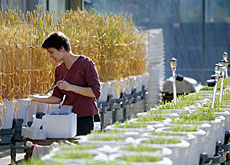
GM projects take seed

The Swiss National Science Foundation has released details of a four-year SFr12 million ($9.8 million) programme involving genetically modified (GM) plants.
Swiss scientists have been given the go-ahead for 27 projects which will help answer questions about the release of transgenic plants, specifically in Switzerland. Three requests to carry out field experiments are pending.
“GM plants offer a wealth of possibilities that can’t be reached via traditional breeding,” said the heads of National Research Project 59 (NRP59) at a news conference on Wednesday.
They added that although GM plants were already used commercially in many parts of the world and a large amount of data had been gathered, many aspects remained unclear.
For that reason, in December 2005 the government gave the Science Foundation the green light for NRP59 with the aim of looking into the uses and risks of releasing GM plants in Switzerland in order to fill the scientific hole and to give an economic basis to the political discussion.
In addition to biological experiments, the research will also involve economic, legal and ethical aspects.
Field experiments
Eights projects have amalgamated to look into plant resistance and various environmental risks by carrying out three proposed field experiments with transgenic wheat.
Two teams of university researchers – from Zurich University’s Institute of Plant Biology and the Institute of Plant Sciences at the city’s Federal Institute of Technology – are set to carry out tests near Zurich and Lausanne, including observations of potential crossbreeding between wheat and wild grass.
They also intend to look at aspects of biological safety to see if the plants have any unexpected impact on the environment, as well as organisms living in the ground or insects.
If the Federal Environment Office gives the go-ahead, trials will run over a two-year period from 2008 in Reckenholz near Zurich, and in Pully, on the outskirts of Lausanne. The office is expected to reach its decision within the next three months.
Contentious
Genetically modified organisms (GMOs) remain a highly contentious issue in Switzerland. In November 2005 the Swiss voted in favour of a five-year ban on the use of GMOs in agriculture. Scientific research, however, is still permitted.
During discussions before the vote all political parties said it was necessary and essential to increase research into this topic and use the five-year moratorium period to clarify questions.
But the last GM crop trials in Switzerland, which took place in Lindau near Zurich in 2004, resulted in major opposition and a lengthy legal battle.
On Wednesday, the environmental organisation Greenpeace, which opposed the 2004 trial both in the courts and with a demonstration at the site, sharply criticised NRP59 for investing most of the funds into field experiments involving GM wheat.
The organisation said it was disappointed that more money had not been spent on looking into the most important questions such as potential negative health effects facing consumers of GM plants, or the ecological and economic effects of GM cultivation on near-natural agriculture.
The Swiss Farmers Association – which supported the five-year moratorium in 2005 – said on Wednesday it would wait a few months for the results of the projects before saying whether NRP59 could solve the open questions facing Swiss agriculture.
swissinfo with agencies
As of April 2007, at least 174 regions, over 4,500 municipalities and other local entities and tens of thousands of farmers and food producers in Europe have declared themselves “GMO-free”.
Across Europe, 70% of consumers have rejected GM foods, according to Friends of the Earth.
Three official GM field experiments have been carried out in Switzerland. In 1991 and 1992 GM potatoes were planted at Changins in canton Vaud and in 2004 research into GM wheat was carried out by the Federal Institute of Technology in Zurich between March 18 and July 14, 2004.
In November 2005 Swiss voters accepted a proposal for a five-year blanket ban on genetically modified organisms (GMOs) in Swiss agriculture.
The result forced the Swiss government to put in place some of the toughest legislation on GMOs in Europe.
The European Union, of which Switzerland is not a member, ended a six-year moratorium on accepting applications for new genetically modified foods in May 2004.
But Germany and France, two of Switzerland’s neighbours, have both voted to uphold national bans on products they deem unsafe.
Spain is the only EU country that has been growing GMOs (GM maize) in any significant quantities. Otherwise, the EU remains largely GMO-free.

In compliance with the JTI standards
More: SWI swissinfo.ch certified by the Journalism Trust Initiative




























You can find an overview of ongoing debates with our journalists here . Please join us!
If you want to start a conversation about a topic raised in this article or want to report factual errors, email us at english@swissinfo.ch.